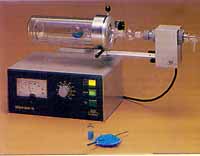
Kugelrohr Distillation is particularly suited to the distillation of small amounts of liquids (20mg or more) and also the high vacuum distillation of high-boiling oils (up to 209) because of the very short distillation path. For fractionation, the boiling points should be about 20C to 30C apart; when multi-bulb tubes are used, the distillation can be repeatedly carried out in the same tube.
The oven consists of two borosilicate glass tubes mounted on a support which carries the iris-type closure. The inner tube is heated by means of a surface-coated electrically conductive layer and a temperature sensor controls the surface temperature so that residues in the bulbs will not rise above the indicated temperature. The outer tube acts as a heat insulator and as a guard for the hot inner tube.
The Kugelrohr bulb tubes are held in a support which has a vacuum stopcock and includes an electric drive unit which rotates the ball tube at 15rpm. This support is free to slide along a guide rail to enable the bulb tube to be inserted or removed from the oven. The control module provides an On/Off switch with indicator lights for power and heaters, a switch for the ball tube drive, temperature selection knob and analogue temperature display.
There are two types of Kugelrohr tubes consisting of a train of five fixed bulbs or of separate bulbs connected by ground-glass joints with a jointed tube at one end. During distillations all the bulbs, except that nearest the tube end, are slid into the oven. After distillation/fractionation the individual bulbs may be cut off or separated.
Specification:
Temperature range 30 to 250C
Oven interior dimensions lxdia 200 x 50mm
Iris diaphragm aperture 5 to 50mm (lockable)
Drive unit speed 15 rpm
Dimensions lxwxh 300 x 330 x 300mm
Weight 7kg
Electrical requirements 240V 400W 50Hz
Price: 1715 English Pounds.
WISDOMwillWIN